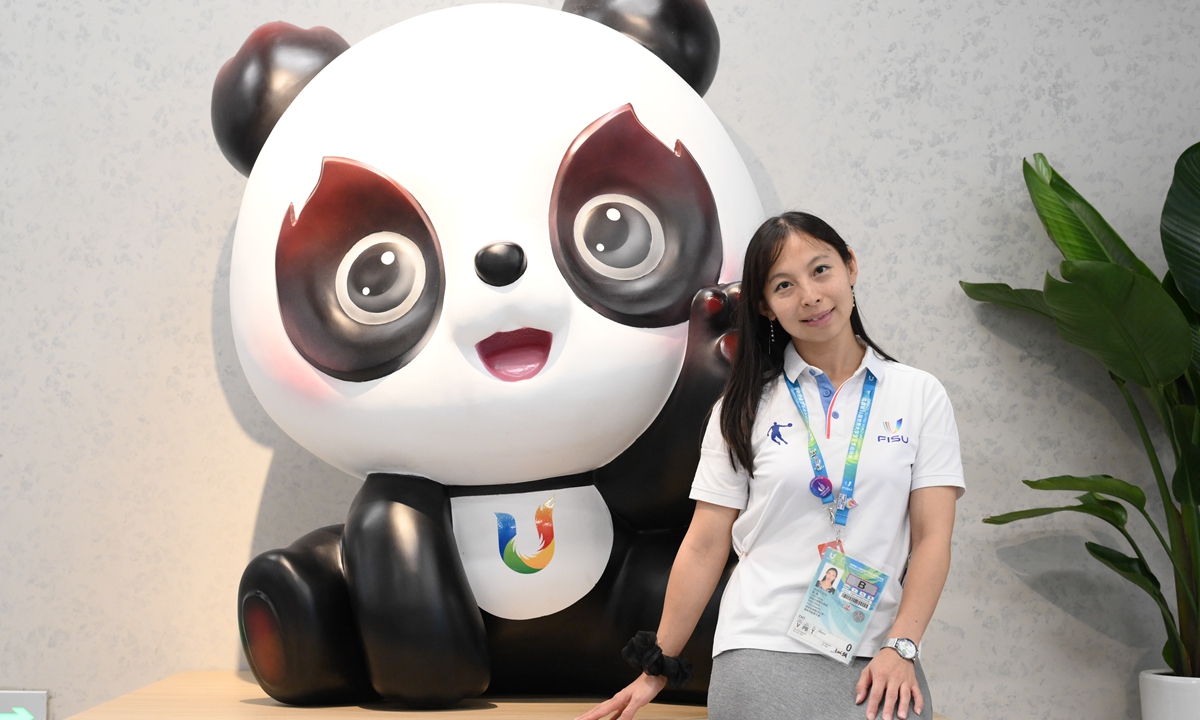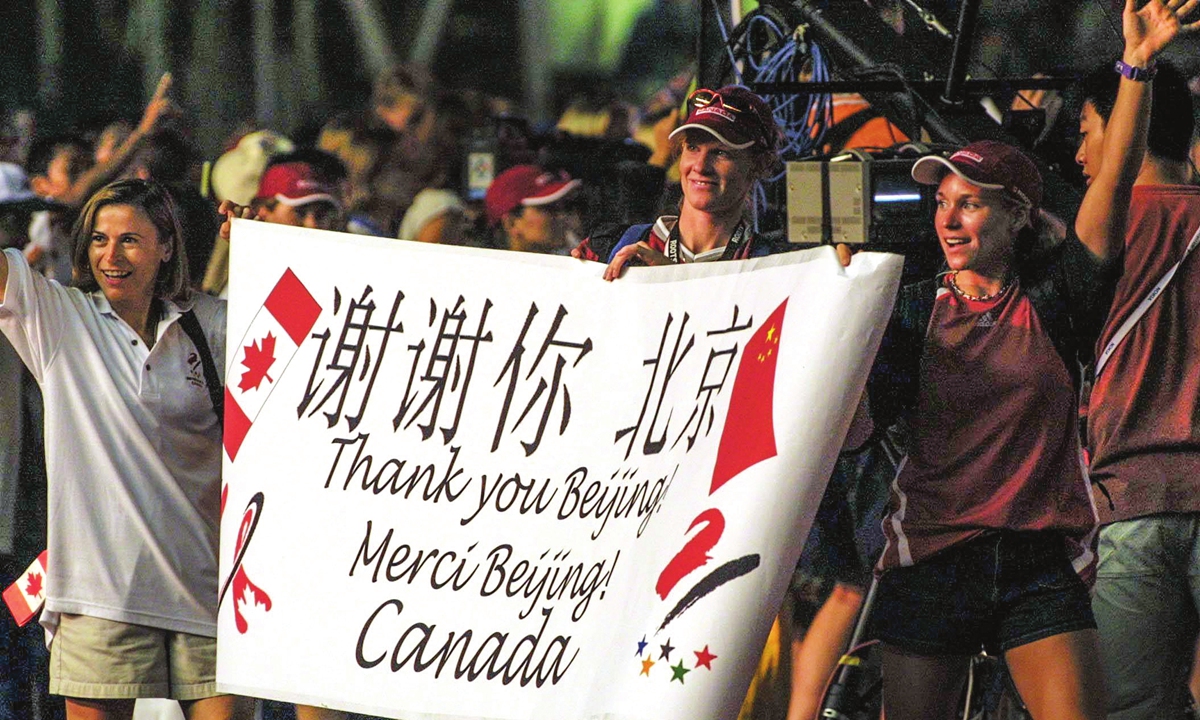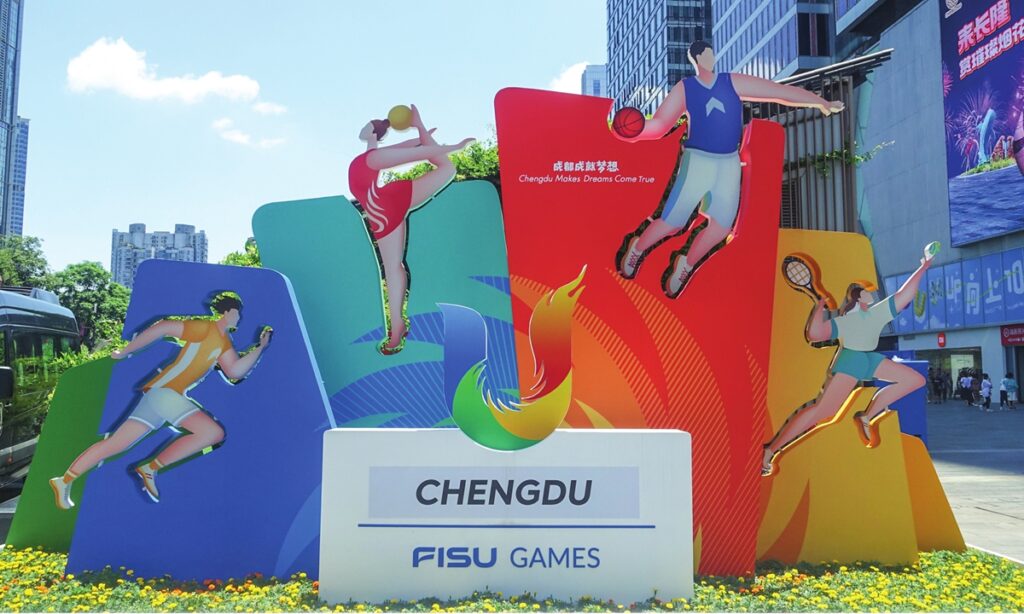Together hand in hand
August 8, 2023 marked the successful conclusion of the Chengdu FISU Games, a prestigious sporting event that showcased the highest level of sports excellence among university students worldwide. Coincidentally, on this day, 15 years ago, the 29th Summer Olympic Games commenced in Beijing.
Over the last 15 years, the Chinese mainland has proudly hosted two Olympic Games and three Universiades. From the iconic motto of “One World, One Dream” during the 2008 Beijing Olympics to “Together for a Shared Future” at the Beijing 2022 Winter Olympics, and now the Chengdu FISU Games’ inspirational theme of “Chengdu Makes Dreams Come True,” these sporting events not only exemplify China’s unwavering commitment to athletic excellence but also serve as a rallying call for cooperation and the creation of a brighter future through cultural exchange and mutual learning.
The Global Times talked to an international sports organization official who has witnessed the hosting of three Universiades by the Chinese mainland and is closely connected to the development of sports among Chinese youth, gaining an insight into her observations on China’s sporting growth in recent years, which has opened up new possibilities and fostered greater expectations for major global sporting events.
This story is a part of the Global Times’ series of “Witness to history,” which features first-hand accounts from witnesses who were at the forefront of historic moments. From scholars, politicians and diplomats to ordinary citizens, their authentic reflections on the impact of historical moments help reveal a sound future for humanity through the solid steps forward taken in the past and the present.

Zhao Jing poses with Rongbao, the mascot of the Chengdu FISU Games at the main media center of the Games on August 2, 2023. Photo:Chen Tao/GT
Wearing long black hair, sports shoes and a polo shirt, Zhao Jing is seamlessly blended in with the university student volunteers at the main media center of the Chengdu FISU Games as she gave an exclusive interview to reporters from the Global Times.
Despite her petite and youthful appearance, Zhao holds the esteemed title of being the youngest International University Sports Federation (FISU) Games Director – Summer, a role that plays a crucial part in the bidding, preparation, and operation of the FISU Games.
Zhao’s introduction to FISU occurred 22 years ago during the Beijing 2001 Universiade as a university student, just like the volunteers at the Chengdu FISU Games. Since then, she has worked as a staff member of FISU during the 2011 Shenzhen Universiade, where she witnessed the event’s innovative and open spirit. In her current role, Zhao leads the team and actively provides assistance, guidance, and supervision to the organizing committee for the FISU Games.
Reflecting on her journey, Zhao expressed her appreciation for the valuable experiences that have shaped her identity over the years. Growing up in cities that bid to host the FISU Games, she has also witnessed China’s rapid development in sports and the improvement of youth careers. In particular, her connection with Chengdu has evolved from that of a city inspector from international sports organizations to that of a partner with a shared destiny and aspiration for the vision of the future.
Run Games with enthusiasm
What Zhao enjoys most at the moment is being immersed in the exciting competitions of the Chengdu FISU Games, and enjoying the event. “I have full confidence and I know there are no contingencies or critical incidents. As you could notice, my phone is not ringing these past minutes, and I don’t need to stressfully always keep an eye on my communication tools,” Zhao told the Global Times.
Much of the credit for this goes to Zhao’s collaborative team. “The Organizing Committee of the Chengdu FISU Games is a very passionate team. Passionate is a word I wouldn’t normally use to easily describe an organizing committee, but they certainly made that impression on me,” she said.
Zhao pointed out that the organizing committee’s passion was not only reflected by the recent process of organizing the Games, but also during the organizing preparation process. ” In any little thing, they would try their hardest to make it the best they can, and from any little suggestion that comes back from any delegation, they would very actively discuss and coordinate to see whether there was any room for improvement.”
However, back in 2018, Chengdu was still simply a name of city in the motherland for Zhao, who lived and worked in Switzerland.
That year, Chengdu expressed its desire to bid for the FISU World University Games to the FISU through the Federation of University Sports of China (FUSC).
Zhao recalled that Chengdu prepared an extremely detailed candidature dossier within a very short period of time, showing a blueprint for Chengdu’s intention to build a high-quality “world event city.”
During their evaluation inspection, the FISU once advised the Chengdu authorities not to recommend building new venues for the FISU Games from the perspective of sustainable development, but Zhao was impressed by the reply from the Chengdu Sports Bureau at that time: “With or without the FISU World University Games, we have to build venues and run events, which meet the needs of our residents and the development of our city’s sports industry.”
On December 13, 2018, the FUSC, People’s Government of Chengdu, and the FISU signed an agreement of intent to host the FISU World University Games in Chengdu. Since then, the city has taken the opportunity of hosting the event to put forward the goals of “organizing competitions,” “managing the city,” “promoting the industry,” and “benefiting the people.” This means that the comprehensive international sports event, which carries the function of home field diplomacy, was given a far more specific meaning by Chengdu, which would be beneficial to all.
After that, Zhao and her team visited the city several times to work together with the organizing committee.
“The whole concept of the FISU Games in Chengdu, including a green and frugal approach, and all the steps that the event would take to benefit the people, reflect the Chengdu authorities’ carefully consideration at the very beginning of the bidding process, that filled me with admiration,” Zhao said.The accumulated working time of nearly a year in Chengdu has also allowed Zhao to immerse herself in the local spirit of the city. To promote Chengdu to the world and bring the world to Chengdu became the orientation of Zhao’s efforts.
After nearly five years of working together with Chengdu, Zhao told the media, “The Chengdu FISU Games are destined to be different and will be surely outstanding.”
Dig deep into sportsmanship
“I really don’t know where else to find a better spectatorship, really!” This was the caption that accompanied the video of a men’s basketball match that Zhao shared on her WeChat moment on August 4.
“The spectator stands were always full at the venues, and I found it particularly touching that whether it was a home game in China or matches between international teams, the spectators were always very enthusiastic and devoted to watching the match,” Zhao said.
Zhao said she was impressed by the men’s Daoshu competition during the Wushu event of the Chengdu FISU Games on July 31, when an Iranian athlete accidentally dropped his equipment. Audiences collectively sighed with pity, but then broke out in applause and shouts of encouragement.
“This kind of enthusiasm and sportsmanship from the spectators has inspired and infected more people including me, making our collective dreams come true,” Zhao said.
The Chengdu FISU Games are the only FISU World University Games in the history of the FISU to be postponed twice.
Zhao noted that during preparations for the event during the COVID-19 pandemic, the organizing committee never halted preparation work.
“Some colleagues suggested that we could learn from the closed-loop method employed at the 2022 World Team Table Tennis Championships, which ‘turned the impossible, possible,'” Zhao said. “But I felt that Chengdu was worth waiting for, worthy of more people and in-depth experiences, and the exploration of its charm, as everyone could feel now.”
During the FISU Games, Zhao saw university athletes from all over the world walking to the streets of Chengdu to eat hot pot, watch Sichuan opera, experience Chengdu’s unique culture, and integrate into the local landscape.
“My FISU colleagues continually congratulated me when they would meet me. They told me that they never thought Chengdu was such a wonderful city, or that the Chengdu FISU Games would be so wonderful,” Zhao said.
The congratulations and praise that poured in from all directions made Zhao feel uplifted and doubly proud. “It is because this is the tournament with which I have been associated from start to finish, and my country has surprised the world once again,” she said.
Explore progress through youth

Athletes display the slogan “Thank you Beijing” during the closing ceremony of the Beijing 2001 Summer Universiade, on September 1, 2001. Photo: VCG
In 2001, Zhao, a Beijing native, was studying at a university in the city. When she heard that the Universiade was recruiting volunteers, she and her classmates signed up with great enthusiasm. After graduation, she went to work for the Chinese Ministry of Education, and in 2005 she became an official for the Chinese delegation to the Universiade in Izmir, Turkey.
In 2008, she joined the FISU, and since then she has experienced the Harbin Winter Universiade and the Shenzhen Universiade, lending her expertise to the FISU in everything from being a tournament assistant to an executive assistant, and a tournament manager, deputy director, and director in later years.
“I have a very obvious traditional Chinese ethic: I am not afraid of working overtime, and when a task is assigned to me, I do my best to execute it well,” she said.
Zhao’s dedication and professionalism have been recognized by the predominantly “Western male international sport industry face.”
She also repeatedly stressed her identity on various occasions stating, “I am Chinese, I know what my country is capable of, and no organizing committee can give me more confidence than the Chinese organizers.”
Zhao said that when she was a volunteer at the Beijing Universiade, the participation of China’s top track and basketball athletes Liu Xiang and Yao Ming made the Universiade a star-studded event, but at that time, she was still very uninformed and didn’t even know what the FISU was. She only remembered that young people throughout the city were very enthusiastic about the event. By the time she was involved in the preparation of the Shenzhen Universiade in 2011, her biggest impression was the openness and innovative spirit of the Shenzhen organizing committee. “Their overall thinking was how to make the event different.”
Now, in Chengdu, Zhao feels the same kind of enthusiasm, openness, and innovation, as well as a greater sense of pride in her country’s growth in youth sports.
More and more sports programs in China are beginning to focus on long-term training comprehensiveness of talent rather than short-term input aimed at achieving immediate brilliant results, Zhao said.
If you have a chance to walk around Chinese universities nowadays, you will see very lively and communicative groups of students, who hold international perspectives, Zhao pointed out. “At the Chengdu FISU Games, Chinese student athletes and volunteers will hug and give high-fives to athletes and friends from all over the world.”
Zhao said the FISU World University Games molded her youth, and also expressed hopes to witness more and more university students utilize the FISU events as a competitive, communication platform, to see a more diversified interactions, cooperation, and a more beautiful sporting landscape.

Graphic: GT
(Global Times)




